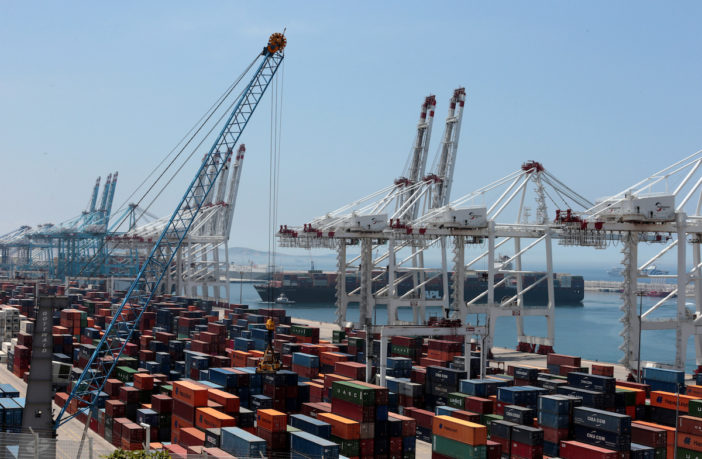Authors: Michaël Tanchum and Nerea Álvarez-Aríztegui, University of Navarra
China is at a crossroads as it expands its economic presence in Northwest Africa. Heightening tensions between Algeria and Morocco could threaten Chinese economic and geopolitical interests in the region. But Beijing may have the power to bridge the divide and reorient the Western Mediterranean toward its Belt and Road Initiative (BRI).
Algeria and Morocco’s detente is fraying. The Algerian-backed Polisario Front, a Sahrawi movement seeking to establish sovereignty over the Western Sahara, ended a 29-year ceasefire with Rabat in November 2020. The Polisario Front resumed its armed struggle shortly before the United States officially recognised Moroccan control over the disputed region in December 2020.
Algeria now confronts critical decisions on how to offset Morocco’s growing power. Algiers is contemplating escalating its support for the Polisario Front and increasing its own military presence on the Moroccan border. This could threaten Chinese interests in Northwest Africa’s resources and undermine its plans to achieve trans-continental connectivity via the Western Mediterranean.
Northwest Africa’s phosphates and rare earth elements are of vital interest to China. Morocco possesses over 70 per cent of global phosphate rock reserves, while Algeria has the world’s fourth-largest stock. In 2018, China’s CITIC Construction signed an agreement with Algeria’s Sonatrach to build a US$6 billion integrated phosphate production facility that would increase Algeria’s annual output to 10 million tons. Meanwhile, China’s Hubei Forbon Technology established a joint venture with Morocco’s state-owned phosphate giant OCP in January 2021 to develop next-generation fertilisers.
Beijing also has its eye on rare earth elements reportedly located in phosphorus deposits in the Western Sahara. The Western Sahara Resource Watch advocacy group has repeatedly alleged Chinese involvement in illegal purchases of Western Saharan phosphates.
China is looking to play a strategic role in the development of Europe–Africa connectivity across the Western Mediterranean. Beijing has a stake in Morocco’s emerging West Africa-to-Western Europe commercial transportation corridor, based on Morocco’s al-Boraq high-speed rail line and the newly-expanded Port of Tanger Med — now the Mediterranean’s largest port.
Tanger Med’s expansion was enabled by investment from China Merchants Group. Chinese firms have opened manufacturing plants in Morocco to integrate into the Europe–Africa value chains created by the al-Boraq rail line and Tanger Med port. CITIC Dicastal established a US$400 million plant to supply equipment to French Groupe PSA’s automotive assembly plant. China Communications Construction Company is building the Mohammed VI Tangier Tech City industrial hub to attract more multinational and Chinese firms to Morocco.
Beijing also supports the creation of an infrastructure corridor through Algeria that will connect sub-Saharan Africa to the Mediterranean. Algiers inked a deal with China State Construction Engineering Corporation and China Harbor Engineering Company in 2016 to construct Algeria’s El Hamdania Port. With a capacity of 6.5 million twenty-foot equivalent units, El Hamdania could function as the hub of an Africa-to-Europe corridor.
Before the United States officially recognised Morocco’s control over the Western Sahara, many African and Arab nations had already opened consulates in the Moroccan-controlled region. As African and Arab solidarity with Algeria’s opposition to Morocco’s sovereignty claims erode, tensions between Algiers and Rabat are climbing. In 2020, Morocco’s Royal Armed Forces announced the construction of a military barracks just 38 kilometres from Algeria’s border. Algerian media portrayed the plan as an escalatory provocation and reported that Algeria’s People’s National Army (ANP) would build two border bases. Algeria also approved a constitutional amendment last year authorising the ANP to intervene outside Algeria’s borders.
China maintains a neutral policy on the Western Sahara dispute, officially supporting UN efforts for a long-delayed Sahrawi referendum, while carefully balancing its economic interests in Morocco and Algeria. Algeria–Morocco tensions have reached a high point, but there is opportunity to reorient the conflict towards cooperation. China can play a constructive role in these negotiations.
While Algeria’s exports to China are minimal, its 2019 imports from China totalled US$5.4 billion. The COVID-19 pandemic and oil price drop have severely impacted Algeria’s economy as oil and gas sales account for 60 per cent of the state budget. Wary of seeking support from the IMF, Algiers is turning towards China. On 11 October 2020, the China International Development Cooperation Agency signed an agreement with Algiers to further deepen Algeria’s participation in China’s BRI.
Rabat can offer opportunities for Algiers to participate in Morocco’s developing commercial connectivity. This would fit well with Beijing’s efforts to integrate the Western Mediterranean into the BRI. For its part Algeria needs to join talks between Morocco and the Polisario Front to secure future arrangements for the Sahrawi.
Beijing, in its new and advantageous strategic position between the disputants, could promote bridging proposals that would benefit all sides. Now is the time for China to facilitate constructive interaction between Rabat and Algiers. Its diplomatic efforts could determine whether the Western Maghreb’s trajectory will be toward cooperation or conflict.
Michaël Tanchum is Adjunct Professor at the University of Navarra, Spain, and a Senior Fellow at the Austrian Institute for European and Security Studies (AIES).
Nerea Álvarez-Aríztegui is a student at the University of Navarra, Spain.







